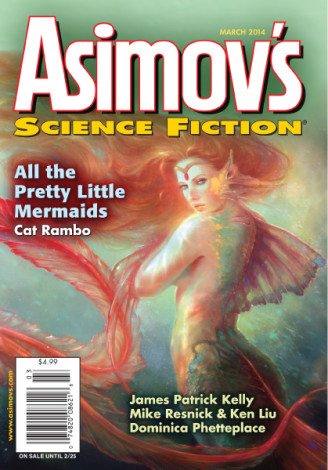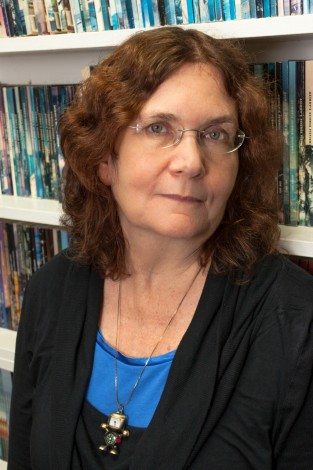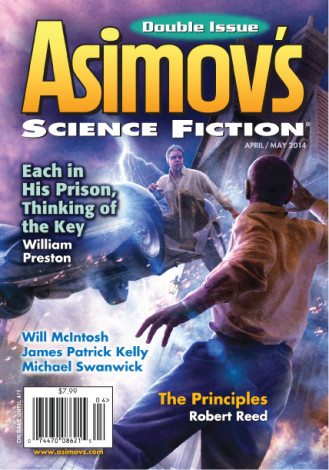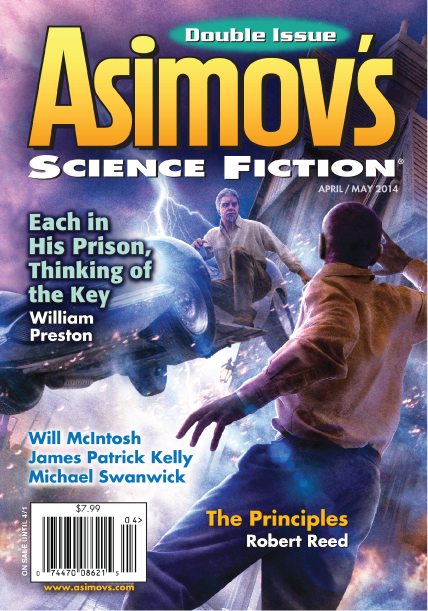
Sheila Williams is the multiple Hugo-award winning editor of Asimov’s Science Fiction magazine. She is also the editor or co-editor of twenty-six anthologies. The most recent of these are Asimov’s Science Fiction Magazine: 30th Anniversary Anthology (Tachyon Publications) and Enter A Future: Fantastic Tales from Asimov’s Science Fiction (Dell Magazines). Sheila is the co-founder of the Dell Magazines Award for Undergraduate Excellence in Science Fiction and Fantasy Writing, which is given out each year in Orlando, Florida, by the International Association for the Fantastic in the Arts.
GeekMom recently asked Sheila questions about growing up in science fiction and fantasy, the ins and outs of the editorial process, and the amazing Dell Magazine Award. Sheila’s daughters joined in, too, contributing their own perspectives and favorite reads. Check it out:
Geek Mom: You came on staff at Asimov’s in the 1980s, and became editor of Asimov’s in 2004. What shifts have been particularly apparent in science fiction over the past three decades?
Sheila Williams: I had the good fortune to work with Shawna McCarthy and Gardner Dozois–two editors who published groundbreaking fiction. They looked for quality writing along with thoughtful extrapolation. The stories I get have continued this tradition. The backgrounds of some of the writers are more diverse now, though, so I am seeing material that explores the future from refreshingly varied perspectives.

GM: Would you talk a bit about your editorial approach to Asimov’s Magazine?
SW: I read for enjoyment. I buy stories that I like to read. Sometimes a story works for me immediately. More often, I have to put it on the back burner for a while. Days later, if I’m still thinking about a story, still amused, haunted, or moved in other ways, I’m probably going to take it. There are my line edits, of course, but some stories need to be revised by the author. Some tales are perfect the first time around. Writers are almost always extremely easy to work with. I can’t promise to buy the revised story, but I usually do, because I only ask for revisions when I’m very serious about a story.
Every issue has to strike a balance. I try not to have more than one time travel or alternate history story in an issue. Try to go easy on parallel universes (though authors are overly fond of this theme). Most stories will qualify as some sort of science fiction, but I might put one fantasy and/or one hard to quantify tale in each issue. Many stories will be serious, but I always shoot for some levity somewhere. Not all stories can be far future, or about teenagers, or Mars, or whatever. Also, there has to be a mix of story lengths.
GM: What challenges and opportunities do you see for women interested in writing for and editing anthologies and magazines with a science fiction focus?
SW: From the editing side, it was never easy for anyone to break into publishing, but it’s certainly gotten harder to find a full-time salaried position with benefits. On the other hand, with Webzines and Kickstarter and other crowdfunding sources, there are a lot more opportunities to engage in the field as a serious sideline editing ones own magazine or anthology. As for writing, I don’t think it’s any more challenging for women to break into SF magazines than it is for men. Breaking in is hard in general. There are a lot more people writing SF then there are story slots, but if the story is good, editors will jump on it. Keep in mind that less than 30 percent of story submissions to Asimov’s are by women. The gender breakdown among the published stories in the magazine is usually about 30 to 33 percent, so women are definitely holding their own. Still, as I say elsewhere, I’d love to see more women reading, writing, and submitting SF.
GM: Tell us about the Dell Magazines Award for Undergraduate Excellence in Science Fiction and Fantasy Writing.
SW: Rick Wilber and I founded the award in 1993. The award is co-sponsored by the International Association for the Fantastic in the Arts and Dell Magazines. The winner gets an expense paid trip to Florida for the award ceremony at the Conference on the Fantastic. They also get to read their story, usually with two established authors. The winner receives $500 and the story is featured on Asimov’s website. Every finalist gets a private consultation with me. The authors go out of their way to spend time talking with the students and the students usually become fast friends. They form writers groups and generally support each other. We see this as a way of encouraging young writers. Many published authors have been award winners or finalists. I love spending my time with these young writers. They are all smart and interesting. Their interests and career trajectories are wide ranging.
It’s great to have this chance to meet and encourage young authors. During our consultation, I ask a lot of personal questions because I need information for my award presentation (an edited version of which will also become a magazine editorial). This has given me a chance to develop a rapport with dozens of aspiring authors. It’s been highly rewarding work.
GM: Your two daughters are both big readers. What kinds of stories do you wish for them in the future?
SW: When I was in sixth grade, my school reader was crammed full of short stories. All but one story featured a young male protagonist. Although she was a gifted pianist, the plot of the one story with a female protagonist was about how she pined with unrequited love for a boy. I was frustrated and asked my parents to find me books about girls who did things and solved their own problems. On a trip to Bermuda, my parents found a British anthology called Adventure Stories for Girls. I must have read that anthology a dozen times. Like most younger readers, my girls have no problem finding lots of terrific fantasy novels. They both love Gail Carson Levine, Diana Wynne Jones (they chose our dog’s name, “Waif,” from one of her books), J.K. Rowling, and many others. My older daughter is 20 and she’s also discovered some SF writers–Connie Willis, Paolo Bacigalupi, Scott Westerfeld, to name a few–but it was harder to find good modern SF for the YA crowd when she was a preteen. I was delighted to see how much Suzanne Collins’ Hunger Games series took off. I like to see my girls reading stories about strong young women who can handle adversity, opt for challenging careers that include the sciences and high tech options, have adventures, and draw on their inner reserves to resolve issues. Other types of stories are fine, too. Life is not all happy endings and a way out doesn’t always exist, but I want them to have the sense that all avenues are open. I’m frustrated by the gender imbalance among science fiction readers.
Girls need to know from an early age that science and technology are cool. Much of our future will be shaped by advances in both, and they should be encouraged to be fifty percent of these industries. Good science fiction with strong and exciting female protagonists can give teens a framework for their dreams and aspirations.
GM: Question for either Juliet or Irene [Sheila’s daughters], or both: What are your favorite books and authors right now?
J: Tuesdays in the Castle and Wednesdays in the Tower by Jessica Day George, the Gregor series by Susan Collins, the Harry Potter books by JK Rowling, and Fairy Lies and Fairy Wings by E.D. Baker.
I: My favorite books are Howl’s Moving Castle, Pump Six, On the Road, Sorcery and Cecilia, and Fire and Hemlock. Diana Wynne Jones is probably my favorite author but I also love Margo Lanagan, Kij Johnson, and Megan Arkenberg.

GM: Question for all three of you: What is it like going to conventions together now that Juliet is old enough to attend panels? I know she sat on a panel at the Austin Worldcon, ‘Should the next Doctor Who be a woman?’ What are your favorite conventions?
I’ve always taken my kids with me when I go to Worldcon, but since I’m working, they usually spent most of their time being tourists with their dad. As they’ve gotten older and developed their own interests in science fiction and fantasy, I’ve been able to incorporate them into my schedule at conventions. Irene is old enough to take in the convention on her own, and Juliet is on the brink. Last year, Irene and a friend attended ICFA with me because of their interest in Neil Gaiman. Juliet delighted in everything Doctor Who at the 2013 World Con. I’m going to bring her with me to Luna Con in March, without her father as back up. I’m curious to see how this works out but not too worried. I brought Irene to a Philcon when she was only a couple of years older than her sister is now. At Philcon, Irene had no problem making friends and doing crafts, etc. I’m pretty sure Juliet will have a similar experience.
I: My favorite convention is Worldcon because there are so many different things to see and people to meet. The one in Glasgow was really cool.
J: It was fun when I got to answer questions and be the center of attention. And being able to bring up points like Kim and Ron from Kim Possible [being] a lot like Amy and Rory from Dr. Who. My favorite convention was the convention in Montréal.
GW: For all of you – Geek or Nerd?
SW: To paraphrase the bard, my interests are vast. I can contain both.
J: Geek.
I: Nerd.
GM: A question for Irene and Juliet: Your mom is amazing. Her editing advice has improved so many stories. What’s the best piece of advice she’s given you? What’s the best piece of advice you’ve given her?
J: Don’t follow strangers in to a car if they offer you candy. Stop talking!
I: Oh that’s hard. I think the best piece of advice she ever gave me was not to date two guys at the same time. She also tells me to not overthink things, which can be very useful. I don’t know if I’ve ever given her good advice.
GM: If you could ask your mom one question about her work, what would it be?
I: Why do you love your job so much?
SW: I’ve loved science fiction and science fiction short stories all my life. When I was a teenager, I dreamed of someday working on a science fiction magazine. At that time I imagined myself filing and running errands. It never occurred to my 14-year-old self that I could actually be the editor. To say that my job is a dream come true is to make an understatement. I love reading the stories, working with authors, and doing the physical work of pulling each issue together.
Asimov’s Science Fiction is available in hardcopy from Dell Magazines. It is also available from multiple purveyors of e-magazines, including: Barnes & Noble | Amazon (kindle) |iPad | Kobo | Magzter | Google play.




3 thoughts on “10 Questions With Award-Winning Science Fiction Editor Sheila Williams”
Comments are closed.